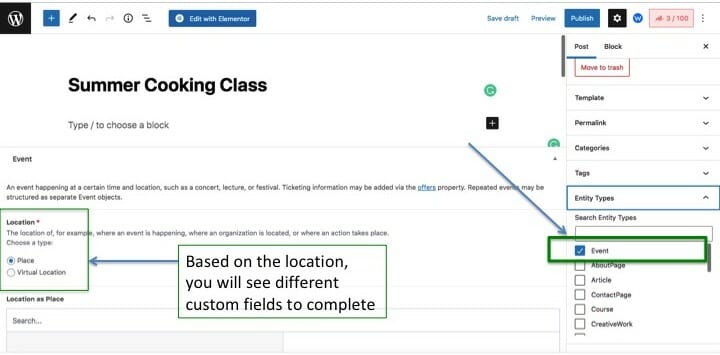If you organize events and want more attendees, this is the entity type for you.
By adding properly structured data to event pages, you help Google understand your pages better and in return get more visitors via Rich Results. These make your site more attractive in search results, increase your organic presence and ultimately attract more clicks.
For example, take the query “upcoming concerts in Rome”. This is the result.
If you have event markup on your web page, you have a better chance of appearing in this Google feature. This means a better ranking in the SERP and therefore greater visibility for the audience performing this search.
What is Event Schema Markup?
Event schema is a type of structured data markup that informs search engines that a particular web page is an event that takes place offline or online, such as concerts, seminars/webinars, meetings and more.
If you want your events to appear in Google’s Rich Results, you have two options.
The first is to place your event on an event aggregation website. If the site automatically implements the event markup scheme on its pages, your content may be eligible for Rich Results. While this solution is simple, it also has drawbacks. These include not being able to manually edit the structured data to implement performance, not driving traffic to your site, and not being able to monitor results via GSC.
The second option is to add the structured data directly into the pages of your website. In this case, you can use code directly or choose a plug-in that allows you to implement event markup, such as WordLift.
How to Add Event Schema Markup Yourself
First, select the entity type Event from the list of entity types on the right. This will display the attribute fields you need to fill in to add the structured data to the event page.
Based on the location, you see different custom fields to complete. If your event has a physical location, you can add the venue. We recommend that you add your event locations with the Entity Type Place, so that you can implement the structure of your dataset and thus your Knowledge Graph. On the other hand, if your event takes place online, you can add the URL of the platform where it takes place.
Now you just need to fill in all the other fields with details about your event.
Testing your Event Schema Markup
To check whether the event schema you have implemented or written has errors, use Google’s Rich Results Test.

